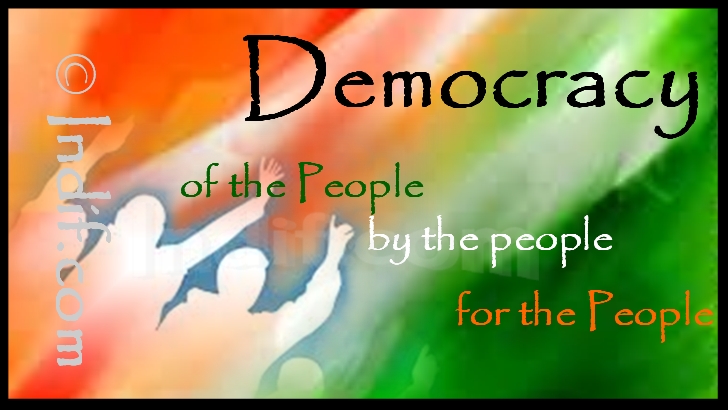Democracy is defined as a government of the people, by the people and for the people. Democracy is a form of government in which people are governed by their own elected representatives. Democracy guarantees some basic rights and freedom for individuals and its voters. These rights are known as fundamental rights.
India is the biggest democracy in the world, with a population of over one billion. India, a union of states, is a sovereign socialist, secular, democratic, republic, with a parliamentary system of government. The republic is governed in terms of the Constitution, which was adopted on 26 November, 1949 and came into force on 26 January, 1950.
It is not possible for all the people in a big country like India to participate in the government. This is why they are required to exercise their franchise and elect their representatives at regular intervals. These representatives from the parliament legislate and form responsible government.
India became a democratic republic infused with the spirit of justice, liberty, equality and fraternity. The Preamble, the Directive Principles of State policy and the Fundamental Rights reflect the Indian ideology as well as the caste, creed, religion, property, or sex have the right to cast their vote. After and election, the majority party or coalition forms the government and its leader become the Prime Minister.
There are two kinds of democracy – Direct and Indirect.
In Switzerland there is direct democracy where the head of the State is directly elected by the people.
While, India is indirect democracy, the Government is formed by peoples’ representatives elected as members of Parliament and such elected representatives choose the Prime Minister. Similarly, at the State level the members of legislative assembly are elected directly by the people and they elect the Chief Minister.
In India, the President is elected through the Electoral College system where the elected members vote on the basis of representation. The Governors for the States are appointed by the President himself and the elections are conducted by the Election Commission of India.
India’s experiments of democracy have taught the world a number of lessons: the successful workings of coalition governments, the unpredictability of voter behavior, the importance of an autonomous and responsive electoral commission, and above all the possibility of political sophistication among the poorest people.
I understand democracy as something that gives the weak the same chance as the strong.
- Mahatma GandhiDemocracy is the road to socialism.
- Karl MarxDemocracy is an impossible thing until the power is shared by all…Even a pariah, a labourer, who makes it possible for you to earn your living, will have his share in self-government – Swarajya or democracy.
- Mahatma Gandhi (Young India, December 1, 1927)If liberty and equality, as is thought by some are chiefly to be found in democracy, they will be best attained when all persons alike share in the government to the utmost.
- AristotleDemocracy is a device that ensures we shall be governed no better than we deserve.
- George Bernard ShawIn democracy it's your vote that counts; In feudalism it's your count that votes.
- Mogens Jallberg









